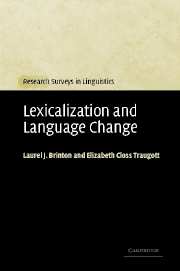Book contents
- Frontmatter
- Contents
- List of figures
- List of tables
- Preface
- List of abbreviations
- 1 Theoretical contexts for the study of lexicalization and grammaticalization
- 2 Lexicalization: definitions and viewpoints
- 3 Views on the relation of lexicalization to grammaticalization
- 4 Toward an integrated approach to lexicalization and grammaticalization
- 5 Case studies
- 6 Conclusion and research questions
- References
- Index of names
- Index of subjects
- Index of words and forms
6 - Conclusion and research questions
Published online by Cambridge University Press: 03 February 2010
- Frontmatter
- Contents
- List of figures
- List of tables
- Preface
- List of abbreviations
- 1 Theoretical contexts for the study of lexicalization and grammaticalization
- 2 Lexicalization: definitions and viewpoints
- 3 Views on the relation of lexicalization to grammaticalization
- 4 Toward an integrated approach to lexicalization and grammaticalization
- 5 Case studies
- 6 Conclusion and research questions
- References
- Index of names
- Index of subjects
- Index of words and forms
Summary
Introduction
This chapter will provide a summary of the book (6.1) followed by a discussion of questions which have emerged from the work and which require further study (6.2), including:
Are there changes in lexicalization and grammaticalization that do not occur or are unlikely to occur?
What constraints are there on transition from one category to another in lexicalization and grammaticalization?
How do large-scale typological shifts affect transition in lexicalization and grammaticalization?
What correlations are there between discourse types and lexicalization and grammaticalization?
What correlations are there between specific lexicalization and grammaticalization patterns and language contact?
Summary
The foregoing study has been an examination of the process of diachronic lexicalization, most especially in light of contemporary work on diachronic grammaticalization, where it has been common to label phenomena which run counter to the expected directionality of grammaticalization as either “lexicalization” or “degrammaticalization.” To a lesser extent, this study has also examined lexicalization in the context of work in morphology, where lexicalization is often equated with routine processes of word formation. Most of the examples have been from English.
The current state of work in lexicalization suggests a number of conflicting interpretations that deserve attention:
Lexical and grammatical have been seen as discrete categories or as part of a gradient/continuum.
Lexicalization is on the one hand viewed from its starting point, as “syntacticogenetic” (i.e., as “falling outside the productive rules of grammar”) or on the other from its endpoint, as “lexicotelic” (i.e., as “adoption into the inventory”).
Lexicalization has been identified with a diverse and often opposing set of phenomena, including those involving processes of fusion leading to decreased compositionality and those involving processes of separation leading to increased autonomy.
[…]
- Type
- Chapter
- Information
- Lexicalization and Language Change , pp. 141 - 160Publisher: Cambridge University PressPrint publication year: 2005



